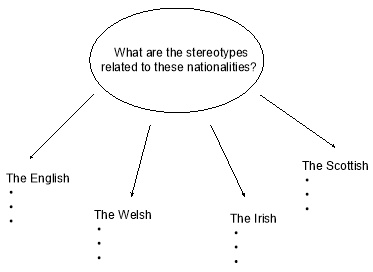Урок “The British sense of humour”
Aims: to expand the vocabulary on the topic
to develop students' reading, speaking and listening skills, memory, cooperation
to develop abilities to express thoughts
to develop memory, cooperation
to be involved into communicative activities
to work in pairs and groups
to find out more about the peculiarities of British character
The lesson “The British sense of humour”
Aims: to expand the vocabulary on the topic
to develop students’ reading, speaking and listening skills, memory, cooperation
to develop abilities to express thoughts
to develop memory, cooperation
to be involved into communicative activities
to work in pairs and groups
to find out more about the peculiarities of British character
Procedure
1. Introduction
Today we’ll speak about the British character, the traits of character typical of the English, the Welsh, the Scottish and the Irish.
1.1. Warmer (Mind map)

1.2. Vocabulary work
Work in pairs and match the words 1-6 with their definitions (A-F). Translate the words into Ukrainian.
1. pun (n) A strange in a funny or interesting way
2. slapstick (n) B a humorous use of a word or words that sound the same but have
different meanings
3. deadpan (adj) C another name for a “sketch”
4. off-the-wall (adj) D try to make something look silly by making fun of it
5. ridicule (v) E humour based on physical actions like hitting each other or falling
over rather than using a language
6. a skit (n) F Pretending to be serious when you’re joking
2 The main part
2.1. Reading
Read the text about the English sense of humour.
Some love it, some hate it, and others simply don’t get it! One thing which is certain is that the British have their own unique sense of humour and it is famous all over the world. British TV comedies or series are shown everywhere and become very popular as soon as they are released.
What makes British comedies so special and captivating is that they draw on a large number of humorous effects at the same time. So, in one British comedy series you’ll often see examples of slapstick comedy, satire, extreme sarcasm, word play (puns) and witty jokes about themselves, other nations and all subjects including taboo issues told in a deadpan way. The serious manner in which the jokes are told makes them even funnier and it is a trademark of the English sense of humour.
The success of the British comedy began with the rise of the so-called “College Humour”, which was produced by well-educated comedians in the 1960s and the 1970s, such as Alan Bennett or the Monty Python team (with John Cleese and Michael Palin), who came up with the most off-the-wall sense of humour. The Monty Python’s sketch about a dead parrot is probably the world’s most famous and hilarious skit in the world! Then came the series such as Fawlty Towers, Mr Bean (with Sir Rowan Atkinson in the title role) “Allo Allo!” The Office and Dr House, M.D. (an American series made popular by one of the best British actors, Hugh Laurie), which won the hearts of millions of people all over the globe.
The English sense of humour may be considered offensive or insensitive at times, but despite all the teasing and ridiculing everything and everyone, it remains the most recognized type of humour in the world, making Britain as famous as the Queen, the Union Jack, double-decker buses and tea!
2.2. Find the following information.
- typical ingredients of a British comedy
- names of popular comedians and comedy teams
- the name of the bird from the world’s most famous sketch
- symbols of Britain famous all over the world
2.3. Listening
Work in groups of three. Listen to the quiz questions and answer them. The answers must be based on the information from this lesson. You get one point for each correct answer. When you finish, pass your answers to another group to check. Each correct answer is worth one point. The winner is the group with the most correct answers.
1. What are two stereotypes about the British?
2. What is a pan?
3. What is the name of the actor who plays Mr. Bean?
4. What are four symbols of the UK mentioned in this unit?
5. What is slapstick?
6. What are two stereotypes about the Scottish?
7. Name two titles of very popular British comedy series.
8. What is the world’s most famous sketch about?
Tapescript:
Reporter: So what are the stereotypes about the English?
Expert: Well, before I talk specifically about the English, there’s a stereotype about all the people living in the British Isles, which is the fact that there are a lot of red heads there. I’m not sure how true this is but that’s what people think. As for the English, they are seen as reserved and unemotional but polite individuals with a terribly sarcastic sense of humour that no one understands. England is also associated with terrible food but delicious puddings and football maniacs, but as with other nations, a lot of these are just stereotypes, and prove untrue in many cases. Like the Scottish, who are perceived as mean by the rest of the world, I know many Scottish people who are actually very generous. And Scottish men, unless they come from a very traditional background, don’t wear kilts either, except on some special occasions. Their traditional food is haggis, which makes some people sick just at the thought of it.
As for the Welsh, well …, the English present them as “naïve sheep lovers” in their jokes but at the same time admire them for their musical talents and passion for rugby, which actually is a very popular sports discipline in most of the English – speaking countries.
Reporter: And the Irish?
Expert: The Irish are often considered to be great dancers and potato lovers but, again, I know a lot of Irish people who are the opposite. Though, I must admit there’s a fair number of redheads with freckles in Ireland, so maybe there’s some truth in stereotypes? However, most of these are often unfair ones!
2.4. Speaking. Work with a partner and answer the questions.
Work in pairs and prepare a questionnaire about your sense of humour, the Ukrainian sense of humour and Ukrainian comedies or comedy series. Write 5 questions to find out about other classmates’ tastes in this area. When you’re ready, work with another pair and interview one another.
e.g: 1. What is your favourite comedy?
2. What makes you laugh?
3. Summing – up
Today you’ve learned about the peculiarities of British character. Thank you for your work. Good-bye!
Home assignment
Prepare a talk on the Ukrainian character.


про публікацію авторської розробки
Додати розробку
